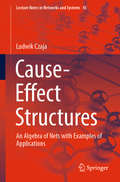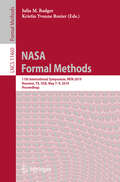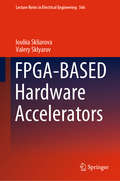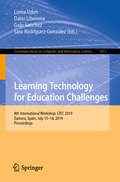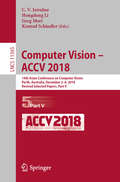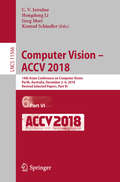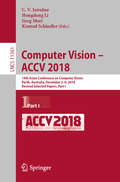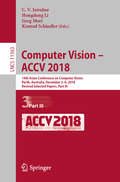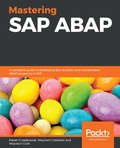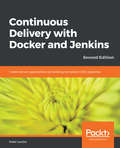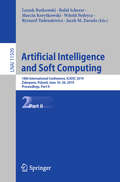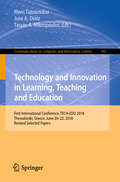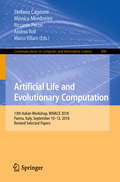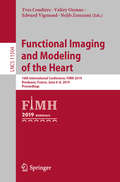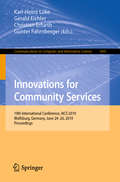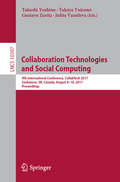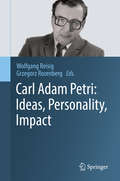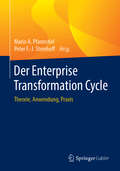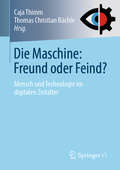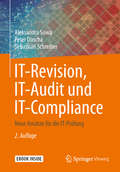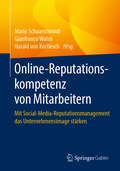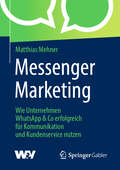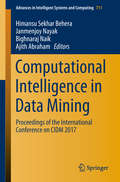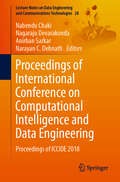- Table View
- List View
Cause-Effect Structures: An Algebra of Nets with Examples of Applications (Lecture Notes in Networks and Systems #45)
by Ludwik CzajaThis book presents a new algebraic system whose interpretation coincides with the behaviour of Petri nets, enhanced with an inhibitory mechanism and four time models. Its goal is to provide a formal means of modelling dynamic tasks, and of testing and verifying properties, in contexts characterised by the parallel execution of actions. However, the task description differs from that of Petri nets. The algebra is a quasi-semiring, “quasi” because of its somewhat restricted distributivity axiom. Expressions of this algebra, the cause–effect structures, have a graphic presentation as nets, but with one kind of named nodes, each annotated by two expressions that specify the type of signal reception from predecessors and transmission to successors. Many structural and behavioural properties are stated with proofs, and illustrative sample tasks are included. The book is intended for all those interested or involved in parallel and distributed computing – students, researchers and practitioners alike.
NASA Formal Methods: 11th International Symposium, NFM 2019, Houston, TX, USA, May 7–9, 2019, Proceedings (Lecture Notes in Computer Science #11460)
by Julia M. Badger Kristin Yvonne RozierThis book constitutes the proceedings of the 11th International Symposium on NASA Formal Methods, NFM 2019, held in Houston, TX, USA, in May 2019. The 20 full and 8 short papers presented in this volume were carefully reviewed and selected from 102 submissions. The papers focus on formal verification, including theorem proving, model checking, and static analysis; advances in automated theorem proving including SAT and SMT solving; use of formal methods in software and system testing; run-time verification; techniques and algorithms for scaling formal methods, such as abstraction and symbolic methods, compositional techniques, as well as parallel and/or distributed techniques; code generation from formally verified models; safety cases and system safety; formal approaches to fault tolerance; theoretical advances and empirical evaluations of formal methods techniques for safety-critical systems, including hybrid and embedded systems; formal methods in systems engineering and model-based development; correct-by-design controller synthesis; formal assurance methods to handle adaptive systems.
FPGA-BASED Hardware Accelerators (Lecture Notes in Electrical Engineering #566)
by Valery Sklyarov Iouliia SkliarovaThis book suggests and describes a number of fast parallel circuits for data/vector processing using FPGA-based hardware accelerators. Three primary areas are covered: searching, sorting, and counting in combinational and iterative networks. These include the application of traditional structures that rely on comparators/swappers as well as alternative networks with a variety of core elements such as adders, logical gates, and look-up tables. The iterative technique discussed in the book enables the sequential reuse of relatively large combinational blocks that execute many parallel operations with small propagation delays. For each type of network discussed, the main focus is on the step-by-step development of the architectures proposed from initial concepts to synthesizable hardware description language specifications. Each type of network is taken through several stages, including modeling the desired functionality in software, the retrieval and automatic conversion of key functions, leading to specifications for optimized hardware modules. The resulting specifications are then synthesized, implemented, and tested in FPGAs using commercial design environments and prototyping boards. The methods proposed can be used in a range of data processing applications, including traditional sorting, the extraction of maximum and minimum subsets from large data sets, communication-time data processing, finding frequently occurring items in a set, and Hamming weight/distance counters/comparators. The book is intended to be a valuable support material for university and industrial engineering courses that involve FPGA-based circuit and system design.
Learning Technology for Education Challenges: 8th International Workshop, LTEC 2019, Zamora, Spain, July 15–18, 2019, Proceedings (Communications in Computer and Information Science #1011)
by Lorna Uden Dario Liberona Galo Sanchez Sara Rodríguez-GonzálezThis book constitutes the refereed proceedings of the 8th International Workshop on Learning Technology for Education Challenges, LTEC 2019, held in Zamora, Spain, in July 2019.The 41 revised full papers presented were carefully reviewed and selected from 83 submissions. The papers are organized in the following topical sections: learning technolgies; learning tools and environment; e-learning and MOOCs; learning practices; social media learning tools; machine learning and evaluation support programs. LTEC 2019 examines how these technologies and pedagogical advances can be used to change the way teachers teach and students learn, while giving special emphasis to the pedagogically effective ways we can harness these new technologies in education.
Computer Vision – ACCV 2018: 14th Asian Conference on Computer Vision, Perth, Australia, December 2–6, 2018, Revised Selected Papers, Part V (Lecture Notes in Computer Science #11365)
by C. V. Jawahar Hongdong Li Greg Mori Konrad SchindlerThe six volume set LNCS 11361-11366 constitutes the proceedings of the 14th Asian Conference on Computer Vision, ACCV 2018, held in Perth, Australia, in December 2018. The total of 274 contributions was carefully reviewed and selected from 979 submissions during two rounds of reviewing and improvement. The papers focus on motion and tracking, segmentation and grouping, image-based modeling, dep learning, object recognition object recognition, object detection and categorization, vision and language, video analysis and event recognition, face and gesture analysis, statistical methods and learning, performance evaluation, medical image analysis, document analysis, optimization methods, RGBD and depth camera processing, robotic vision, applications of computer vision.
Computer Vision – ACCV 2018: 14th Asian Conference on Computer Vision, Perth, Australia, December 2–6, 2018, Revised Selected Papers, Part VI (Lecture Notes in Computer Science #11366)
by C. V. Jawahar Hongdong Li Greg Mori Konrad SchindlerThe six volume set LNCS 11361-11366 constitutes the proceedings of the 14th Asian Conference on Computer Vision, ACCV 2018, held in Perth, Australia, in December 2018. The total of 274 contributions was carefully reviewed and selected from 979 submissions during two rounds of reviewing and improvement. The papers focus on motion and tracking, segmentation and grouping, image-based modeling, dep learning, object recognition object recognition, object detection and categorization, vision and language, video analysis and event recognition, face and gesture analysis, statistical methods and learning, performance evaluation, medical image analysis, document analysis, optimization methods, RGBD and depth camera processing, robotic vision, applications of computer vision.
Computer Vision – ACCV 2018: 14th Asian Conference on Computer Vision, Perth, Australia, December 2–6, 2018, Revised Selected Papers, Part I (Lecture Notes in Computer Science #11361)
by C. V. Jawahar Hongdong Li Greg Mori Konrad SchindlerThe six volume set LNCS 11361-11366 constitutes the proceedings of the 14th Asian Conference on Computer Vision, ACCV 2018, held in Perth, Australia, in December 2018. The total of 274 contributions was carefully reviewed and selected from 979 submissions during two rounds of reviewing and improvement. The papers focus on motion and tracking, segmentation and grouping, image-based modeling, dep learning, object recognition object recognition, object detection and categorization, vision and language, video analysis and event recognition, face and gesture analysis, statistical methods and learning, performance evaluation, medical image analysis, document analysis, optimization methods, RGBD and depth camera processing, robotic vision, applications of computer vision.
Computer Vision – ACCV 2018: 14th Asian Conference on Computer Vision, Perth, Australia, December 2–6, 2018, Revised Selected Papers, Part III (Lecture Notes in Computer Science #11363)
by C. V. Jawahar Hongdong Li Greg Mori Konrad SchindlerThe six volume set LNCS 11361-11366 constitutes the proceedings of the 14th Asian Conference on Computer Vision, ACCV 2018, held in Perth, Australia, in December 2018. The total of 274 contributions was carefully reviewed and selected from 979 submissions during two rounds of reviewing and improvement. The papers focus on motion and tracking, segmentation and grouping, image-based modeling, dep learning, object recognition object recognition, object detection and categorization, vision and language, video analysis and event recognition, face and gesture analysis, statistical methods and learning, performance evaluation, medical image analysis, document analysis, optimization methods, RGBD and depth camera processing, robotic vision, applications of computer vision.
Mastering SAP ABAP: A complete guide to developing fast, durable, and maintainable ABAP programs in SAP
by Paweł Grześkowiak Wojciech Ciesielski Wojciech ĆwikTake your SAP ABAP skills to the next level by mastering ABAP programming techniques with the help of real-world examplesKey FeaturesBecome adept at building interfaces and explore ABAP tools and techniquesDiscover the modern functionalities available in the latest version of ABAPLearn the process of creating stunning HTML5 applications using SAPUI5Book DescriptionAdvanced Business Application Programming (ABAP) is an established and complex programming language in the IT industry. This book is designed to help you use the latest ABAP techniques and apply legacy constructions using practical examples.You'll start with a quick refresher on language and database concepts, followed by agile techniques for adding custom code to a modern ABAP system. After this, you will get up to speed with the complete ABAP toolset for importing data to and from different environments. Next, you'll learn how to print forms and work with the different ABAP tools for Extensible Markup Language (XML) manipulation. While covering further chapters, you'll gain insights into building stunning UI5 interfaces, in addition to learning how to develop simple apps using the Business Object Processing Framework (BOPF). You will also pick up the technique of handling exceptions and performing testing in ABAP. In the concluding chapters, you can look forward to grasping various techniques for optimizing the performance of programs using a variety of performance analysis tools.By the end of this book, you will have the expertise you need to confidently build maintainable programs in Systems, Applications, and Products (SAP).What you will learnCreate stable and error-free ABAP programsLeverage new ABAP concepts including object-oriented programming(OOP) and Model-View-Controller (MVC)Learn to add custom code to your existing SAP programSpeed up your ABAP programs by spotting bottlenecksUnderstand techniques such as performance tuning and optimizationDevelop modern and beautiful user interfaces (UIs) in an ABAP environmentBuild multiple classes with any nesting levelWho this book is forThis book is for developers who want to learn and use ABAP skills to become an industry expert. Familiarity with object-oriented programming concepts is expected.
Continuous Delivery with Docker and Jenkins: Create secure applications by building complete CI/CD pipelines, 2nd Edition
by Rafał LeszkoCreate a complete Continuous Delivery process using modern DevOps tools such as Docker, Kubernetes, Jenkins, Docker Hub, Ansible, GitHub and many more.Key FeaturesBuild reliable and secure applications using Docker containers.Create a highly available environment to scale a Docker servers using KubernetesImplement advance continuous delivery process by parallelizing the pipeline tasksBook DescriptionContinuous Delivery with Docker and Jenkins, Second Edition will explain the advantages of combining Jenkins and Docker to improve the continuous integration and delivery process of an app development. It will start with setting up a Docker server and configuring Jenkins on it. It will then provide steps to build applications on Docker files and integrate them with Jenkins using continuous delivery processes such as continuous integration, automated acceptance testing, and configuration management.Moving on, you will learn how to ensure quick application deployment with Docker containers along with scaling Jenkins using Kubernetes. Next, you will get to know how to deploy applications using Docker images and testing them with Jenkins. Towards the end, the book will touch base with missing parts of the CD pipeline, which are the environments and infrastructure, application versioning, and nonfunctional testing.By the end of the book, you will be enhancing the DevOps workflow by integrating the functionalities of Docker and Jenkins.What you will learnGet to grips with docker fundamentals and how to dockerize an application for the CD processLearn how to use Jenkins on the Cloud environmentsScale a pool of Docker servers using KubernetesCreate multi-container applications using Docker ComposeWrite acceptance tests using Cucumber and run them in the Docker ecosystem using JenkinsPublish a built Docker image to a Docker Registry and deploy cycles of Jenkins pipelines using community best practicesWho this book is forThe book targets DevOps engineers, system administrators, docker professionals or any stakeholders who would like to explore the power of working with Docker and Jenkins together. No prior knowledge of DevOps is required for this book.
Artificial Intelligence and Soft Computing: 18th International Conference, ICAISC 2019, Zakopane, Poland, June 16–20, 2019, Proceedings, Part II (Lecture Notes in Computer Science #11509)
by Witold Pedrycz Leszek Rutkowski Marcin Korytkowski Rafał Scherer Ryszard Tadeusiewicz Jacek M. ZuradaThe two-volume set LNCS 11508 and 11509 constitutes the refereed proceedings of of the 18th International Conference on Artificial Intelligence and Soft Computing, ICAISC 2019, held in Zakopane, Poland, in June 2019. The 122 revised full papers presented were carefully reviewed and selected from 333 submissions. The papers included in the first volume are organized in the following five parts: neural networks and their applications; fuzzy systems and their applications; evolutionary algorithms and their applications; pattern classification; artificial intelligence in modeling and simulation. The papers included in the second volume are organized in the following five parts: computer vision, image and speech analysis; bioinformatics, biometrics, and medical applications; data mining; various problems of artificial intelligence; agent systems, robotics and control.
Technology and Innovation in Learning, Teaching and Education: First International Conference, TECH-EDU 2018, Thessaloniki, Greece, June 20–22, 2018, Revised Selected Papers (Communications in Computer and Information Science #993)
by José A. Diniz Meni Tsitouridou Tassos A. MikropoulosThis book constitutes the thoroughly refereed post-conference proceedings of the First International Conference on Technology and Innovation in Learning, Teaching and Education, TECH-EDU 2018, held in Thessaloniki, Greece, on June 20-22, 2018. The 30 revised full papers along with 18 short papers presented were carefully reviewed and selected from 80 submissions.The papers are organized in topical sections on new technologies and teaching approaches to promote the strategies of self and co-regulation learning (new-TECH to SCRL); eLearning 2.0: trends, challenges and innovative perspectives; building critical thinking in higher education: meeting the challenge; digital tools in S and T learning; exploratory potentialities of emerging technologies in education; learning technologies; digital technologies and instructional design; big data in education and learning analytics.
Artificial Life and Evolutionary Computation: 13th Italian Workshop, WIVACE 2018, Parma, Italy, September 10–12, 2018, Revised Selected Papers (Communications in Computer and Information Science #900)
by Stefano Cagnoni Marco Villani Andrea Roli Monica Mordonini Riccardo PecoriThis book constitutes the revised selected papers of the 13th Italian Workshop on Artificial Life and Evolutionary Computation, WIVACE 2018, held in Parma, Italy, in September 2018. The 12 full papers presented were thoroughly reviewed and selected from 30 submissions. They cover the following topics: Boolean networks and complex systems; economic, societal and technological applications; chemical, biological and medical applications. The chapter “Unveiling Latent Relations in the Photonics Techno-Economic Complex System” is open access under a CC BY 4.0 license at link.springer.com.
Functional Imaging and Modeling of the Heart: 10th International Conference, FIMH 2019, Bordeaux, France, June 6–8, 2019, Proceedings (Lecture Notes in Computer Science #11504)
by Yves Coudière Valéry Ozenne Edward Vigmond Nejib ZemzemiThis book constitutes the refereed proceedings of the 10th International Conference on Functional Imaging and Modeling of the Heart, held in Bordeaux, France, in June 2019.The 46 revised full papers were carefully reviewed and selected from 50 submissions. The focus of the papers is on following topics: Electrophysiology: mapping and biophysical modelling; Novel imaging tools and analysis methods for myocardial tissue characterization and remodeling; Biomechanics: modeling and tissue property measurements; Advanced cardiac image analysis tools for diagnostic and interventions.
Innovations for Community Services: 19th International Conference, I4CS 2019, Wolfsburg, Germany, June 24-26, 2019, Proceedings (Communications in Computer and Information Science #1041)
by Günter Fahrnberger Gerald Eichler Christian Erfurth Karl-Heinz LükeThis book constitutes the refereed proceedings of the 19th International Conference on Innovations for Community Services, I4CS 2019, held in Wolfsburg, Germany, in June 2019. The 16 revised full papers presented in this volume were carefully reviewed and selected from 43 submissions. The papers are organized in topical sections on communication systems; teaching and collaboration; smart cities; innovations and digital transformation; data analytics and models; community and quality.
Collaboration Technologies and Social Computing: 9th International Conference, CollabTech 2017, Saskatoon, SK, Canada, August 8–10, 2017, Proceedings (Lecture Notes in Computer Science #10397)
by Julita Vassileva Takaya Yuizono Takashi Yoshino Gustavo ZuritaThis book constitutes the refereed proceedings of the 9th International Conference on Collaboration Technologies, CollabTech 2017, held in Saskatoon, SK, Canada, in August 2017. The 10 revised full papers presented in this book together with 6 short papers were carefully reviewed and selected from 37 submissions. The papers focus on topics such as: CSCW system architectures and applications; social computing; crowdsourcing; inter-cultural collaboration; collaborative communication systems; embodied collaboration systems; shared virtual/augmented environments; smart devices for collaboration; computer supported collaborative learning (CSCL); collaborative entertainment systems; computer supported cooperative design (CSCD); and social science studies on collaboration.
Carl Adam Petri: Ideas, Personality, Impact
by Wolfgang Reisig Grzegorz RozenbergThis book offers an overview of the key ideas of Petri nets, how they were developed, and how they were applied in diverse applications. The chapters in the first part offer individual perspectives on the impact of Petri’s work. The second part of the book contains personal memories from researchers who collaborated with him closely, in particular they recount his unique personality. The chapters in the third part offer more conventional treatments on various aspects of current Petri net research, and the fourth part examines the wide applications of Petri nets, and the relationships with other domains.The editors and authors are the leading researchers in this domain, and this book will be a valuable insight for researchers in computer science, particularly those engaged with concurrency and distributed systems.
Revolución senior: El auge de la generación + 45
by Sebastián CampanarioSebastián Campanario cuenta de qué modo los +45 tendrán un lugar protagónico en los próximos años. Una propuesta original y disruptiva, que da las claves para deconstruir nuestros prejuicios etarios y entender los huracanes de cambio que estamos atravesando. ¿Solo los jóvenes son creativos e innovadores? ¿Qué podrían hacer las empresas y los gobiernos para dejar de ver los años como un problema y aprovechar su potencial económico? ¿A qué edad, realmente, uno considera que los demás son viejos? Así como sucedió con el debate de género, crece la conciencia sobre el estigma de valores negativos atribuidos a la vida adulta. El advenimiento de los primeros millennials cincuentones no está lejos, así que las economías se están replanteando su relación con los mayores de esa edad. Sebastián Campanario cuenta de qué modo los +45 tendrán un lugar protagónico en los próximos años, y da las claves para deconstruir nuestros prejuicios etarios y entender los huracanes de cambio que estamos atravesando. Mitos, estadísticas y testimonios en torno a la generación senior en la era de la inteligencia adaptativa. Paso a paso, cómo será "el contraataque de los clásicos", en uno de los libros más disruptivos y originales.
Der Enterprise Transformation Cycle: Theorie, Anwendung, Praxis
by Mario A. Pfannstiel Peter F.-J. SteinhoffDas Herausgeberwerk vermittelt fundiert und praxisnah, wie Unternehmen eine Transformation und das Transformationsmanagement mit der methodischen Vorgehensweise des Enterprise Transformation Cycle (ETC) meistern können. Der ETC ist ein modulares zielgerichtetes Regelkreissystem zur systematischen Transformation von Geschäftsprozessen, Systembereichen, Industrien, Unternehmen und Branchen. Er beschreibt nicht nur die Ideengenerierung, die Veränderung und die Wertschöpfung, sondern auch die operative und strategische Vorgehensweise bei der Umsetzung von Projekten. In den einzelnen Beiträgen werden neben einer theoretischen Einführung und einem Methodenteil auch praktische Umsetzungsbeispiele verschiedener Branchen vorgestellt und Handlungsempfehlungen für Unternehmen aufgezeigt. Das Buch richtet sich an Entscheidungsträger, Führungskräfte, Praktiker, Wissenschaftler, Verbände, Personalverantwortliche und Unternehmensberater.
Die Maschine: Mensch und Technologie im digitalen Zeitalter
by Caja Thimm Thomas Christian BächleDie Maschine – Freund oder Feind? Selbstverständlich folgt darauf keine eindeutige Antwort, denn in den bekannten Deutungen des Verhältnisses zwischen den Maschinen und den Menschen findet sich immer beides. Spätestens mit der industriellen Revolution ist die Maschine zum Objekt sehr ambivalenter Bewertungen geworden. Sie symbolisiert Fortschritt und Erlösung und gilt doch zugleich als Ursache und Antreiber gesellschaftlicher Konflikte. Eine ähnliche Ambivalenz ist auch heute zu beobachten: Die Angst vor der Maschine ist nicht nur mit Themen wie dem Verschwinden der Arbeit verbunden, sondern mit dystopischen Vorstellungen vom vollständigen Untergang der Menschheit: Künstliche Intelligenz beherrscht menschliches Denken und Handeln, die Manipulationsmacht durch digitale Großkonzerne führt zu einem „Feudalismus 2.0“. Gerade weil die Angst vor den Maschinen und ihren sozialen und politischen Auswirkungen als Topos aus dem größeren Kontext des Mensch-Technik-Verhältnisses bekannt ist, kommt der mit diesem Band verfolgten Aktualisierung dieser Debatte ein wichtiger Stellenwert zu.Der InhaltDie Maschine: Metapher, Mythos, Objekt ● Der Mensch als „Gehirnmaschine“ ● Die schöne neue Cyborg-Welt im japanischen Anime ● Autonome Systeme, Roboter und ethische Implikationen ● Digitaler Feudalismus ● Computer gegen Arbeiter: Digitale Technologien und das Verschwinden der Arbeit ● „Hochinvasive Überwachung“ ● Autonome Waffensysteme und die Imagination menschlicher Kontrolle ● Internetsucht ● Die Digitalisierung menschlicher ReproduktionDie HerausgeberDr. Caja Thimm ist Professorin für Medienwissenschaft und Intermedialität in der Abteilung Medienwissenschaft des Instituts für Sprach-, Medien- und Musikwissenschaft der Universität Bonn.Dr. Thomas Christian Bächle ist Medienwissenschaftler und leitet am Alexander von Humboldt Institut für Internet und Gesellschaft (HIIG) in Berlin das Forschungsprogramm „Die Entwicklung der digitalen Gesellschaft“.
IT-Revision, IT-Audit und IT-Compliance: Neue Ansätze für die IT-Prüfung
by Aleksandra Sowa Peter Duscha Sebastian SchreiberAuf Grundlage des risikoorientierten Prüfungsansatzes zeigt dieses Buch, wie effektive Prüfungsaktivitäten in einem komplexen Prüfungsumfeld mit besonderer Berücksichtigung aktueller Topthemen wie Datenschutz, Cybersecurity, Penetrationstests und Investigationen bei einer wachsenden Anzahl unternehmensinterner Ermittlungen durchgeführt werden können. Neuartige Instrumente und Methoden für die Arbeit der IT-Revision werden aufgezeigt und neue Ansätze diskutiert. In der zweiten, überarbeiteten und aktualisierten Auflage erfahren die Meldepflichten nach DSGVO, ITSiG bzw. NIS-Richtlinie eine besondere Betrachtung. Das Buch hilft, die Arbeitsweisen der Revision systematisch zu erfassen sowie Prüfungen zu planen und durchzuführen. Dabei bietet es sowohl fertige Lösungen als auch „Hilfe zur Selbsthilfe“ an.
Online-Reputationskompetenz von Mitarbeitern: Mit Social-Media-Reputationsmanagement das Unternehmensimage stärken
by Gianfranco Walsh Mario Schaarschmidt Harald Von Korflesch?In diesem Buch dreht sich alles um das Online-Reputationsmanagement. Dabei geht es um die Fragen, wie Mitarbeiter Social Media nutzen und welchen Einfluss Sie damit auf das Image eines Unternehmens haben können.Mit klaren Handlungsanweisungen zeigt Ihnen dieses Buch, wie Sie mithilfe eines sinnvollen Online-Reputationsmanagements Ihre Mitarbeiter in Bezug auf Risiken und Gefahren, die von Social Media ausgehen, wappnen können.Die Autoren beschäftigen sich mit verschiedenen Phänomenen, die in Zusammenhang mit den Mitarbeitern eines Unternehmens interessant sind. Es geht beispielsweise um Strategien zur Messung der Social-Media-Kompetenz eines Mitarbeiters in Bezug auf die Unternehmensreputation oder die Analyse von Unternehmensbewertungsportalen.
Messenger Marketing: Wie Unternehmen WhatsApp & Co erfolgreich für Kommunikation und Kundenservice nutzen
by Matthias MehnerDieser Leitfaden zeigt Ihnen, wie Sie Messenger-Dienste für Kommunikationsziele im Unternehmen erfolgreich einsetzen können. Sie erhalten gebündelt praxiserprobtes Wissen zu den Einsatzmöglichkeiten der verschiedenen Messenger. Erfahren Sie alles über den Weg zur richtigen Strategie, die relevanten Kennzahlen, ROI-Optimierung, die DSGVO-konforme Umsetzung und vieles mehr – anschaulich dargestellt anhand von realen Beispielen aus verschiedensten Branchen. Rund 90 Prozent der Internetnutzer in Deutschland verwenden Messenger, 81 Prozent davon nutzen WhatsApp. Die Anzahl der Nutzer von Messenger Apps wie WhatsApp, Facebook Messenger, Apple Business Chat & Co wächst seit Jahren kontinuierlich. Sie überflügelt global längst die Nutzung von Social-Media-Kanälen wie Facebook, Twitter oder Snapchat. Auch traditionelle Kommunikationskanäle wie E-Mai oder Telefon verlieren im Hinblick auf Messenger immer mehr an Bedeutung. In diesem Buch erhalten Unternehmen, Vereine und Organisationen Ideen für die Anwendung, Einblicke in Best Cases, konkrete Kennzahlen für die Erfolgsmessung sowie Tool-Tipps und Checklisten für die Umsetzung.Mit Gastbeiträgen von Stephan Schreyer und Rechtsanwalt Dr. Carsten Ulbricht.
Computational Intelligence in Data Mining: Proceedings of the International Conference on CIDM 2017 (Advances in Intelligent Systems and Computing #711)
by Ajith Abraham Himansu Sekhar Behera Janmenjoy Nayak Bighnaraj NaikThe International Conference on “Computational Intelligence in Data Mining” (ICCIDM), after three successful versions, has reached to its fourth version with a lot of aspiration. The best selected conference papers are reviewed and compiled to form this volume. The proceedings discusses the latest solutions, scientific results and methods in solving intriguing problems in the fields of data mining, computational intelligence, big data analytics, and soft computing. The volume presents a sneak preview into the strengths and weakness of trending applications and research findings in the field of computational intelligence and data mining along with related field.
Proceedings of International Conference on Computational Intelligence and Data Engineering: Proceedings of ICCIDE 2018 (Lecture Notes on Data Engineering and Communications Technologies #28)
by Nabendu Chaki Nagaraju Devarakonda Anirban Sarkar Narayan C. DebnathThe book presents high-quality research work on cutting-edge technologies and the most-happening areas of computational intelligence and data engineering. It includes selected papers from the International Conference on Computational Intelligence and Data Engineering (ICCIDE 2018). The conference was conceived as a forum for researchers from academia and industry to present and share ideas and results and allow them to develop a comprehensive understanding of the challenges of technological advancements from different viewpoints. As such, this book helps foster strong links between academia and industry. It covers various topics, including collective intelligence, intelligent transportation systems, fuzzy systems, Bayesian network, ant colony optimization, data privacy and security, data mining, data warehousing, big data analytics, cloud computing, natural language processing, swarm intelligence, and speech processing.
